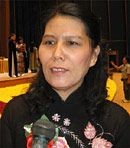Raising Vietnamese women’s capabilities in the integration process

Following is the full text of the interview.
Reporter: Apart from the outcomes achieved in the previous term, what are the pending issues that need to be resolved and what solutions will the VWU’s new Presidium use to deal with these issues and promote women’s progress in the future?
Mrs Hoa: The congress highlighted the great achievements recorded by Vietnamese women over recent years while pointing out the weaknesses in the union’s activities at all levels. The VWU has failed to gather and encourage female intellectuals, female entrepreneurs, elderly women, and female employees working in industrial parks in their activities while the protection of women’s interests and the implementation of the union’ statutes have proved ineffective. Women’s academic standards and professional skills still remain poor, making it hard for them to find employment and increase their incomes. In addition, the VWU has not yet devised the appropriate measures to effectively tackle issues surrounding women’s dignity and honour.
The congress has approved tasks and solutions to raise women’s capabilities and qualifications to ensure that women are socially aware, are in good health and lead healthy lifestyles. 
We have called on all women to actively engage in the movement “Studying and Following late President Ho Chi Minh’s moral example” which partly encourages creativity and family happiness.
Taking a representative role for women across the country, the VWU should actively take part in the legislation process in order to revamp policies on gender equality relating to women’s interests. Furthermore, the VWU should help women develop the household economy, reduce poverty, get stable incomes and improve their living standards. It is also essential to improve professional skills for VWU staff to enable them to implement the resolutions adopted at the 10th National Women’s Congress effectively.
Reporter: Generating jobs, increasing capabilities and knowledge for women are considered important issues in the process of international integration. What are the measures the VWU will promote to resolve the above-mentioned issues?
Mrs Hoa: We have finalised a project on vocational training and job creation for women, especially those aged between 35-40, to be submitted to the Government for consideration. Women within this age bracket often face difficulties in resolving family and child-related issues so they find it hard to serve their apprenticeships far from home. Therefore, under the project, they can become apprentices and later on be able to increase their incomes in their own localities.
Our target set for this term is to provide vocational training for approximately 50,000 women, help them to increase their academic standards to tertiary levels, apply sci-tech advances to production, access loans to boost production and business activities and create jobs.
Women chapters at all levels will also work with businesses, particularly businesses directed by women, to provide training and jobs for more women. There will be many things done by the chapters and I believe that they will fulfil the set targets with support from the Party, State, ministries and business community.
Reporter: There are public concerns over the fact that some Vietnamese women get married to foreigners for economic purposes. This has partly affected the prestige of Vietnamese women. What is the union’s point of view about this?
Mrs Hoa: This has been a concern for women’s chapters at all levels for some time. It is a fact that some Vietnamese women get married to foreigners for economic purposes, which has affected the honour, dignity and interests of all Vietnamese women. We have come up with a number of solutions, with a focus on informing them about the danger and risks of getting married to foreigners as well as information about love, marriage, law, policy and the customs of their fiance’s country. In the long run, the chapters will help women with job training and loans so that they can find jobs and improve their standard of living
Ultimately, some women get married to foreigners only because they want to have a better life. Therefore, we have set up centres to support women who are married to foreigners in 12 provinces and cities. The centres aims to offer consultancy to women about advantages and disadvantages of such marriages and provide them with information about the law and the customs of their fiance’s country.
In addition, we work closely with Vietnamese embassies abroad to help Vietnamese women whose legal rights have been violated by their foreign husbands. In our plan, we will work with experts in countries which have the most foreign-married Vietnamese women, such as the
Reporter: The Law on Gender Equality came into effect on July 1, 2007. How has the union disseminated the law to women across the country?
Mrs Hoa: Firstly, we will disseminate the content of the new law to the staff of women chapters at all levels. Secondly, we will distribute leaflets and other publications to people of social strata because women alone cannot promote gender equality themselves. Thirdly, we will make full use of the mass media, such as television, radio and the Internet to put the law in practice. The union also practices a supervisory role and gathers opinions from the union’s staff on how to implement the law. In addition, the union will cooperate with relevant ministries and sectors to integrate the law into other regulations and policies. With such measures, we believe that the Law on Gender Equality will be well implemented.
Reporter: Thank you very much.






